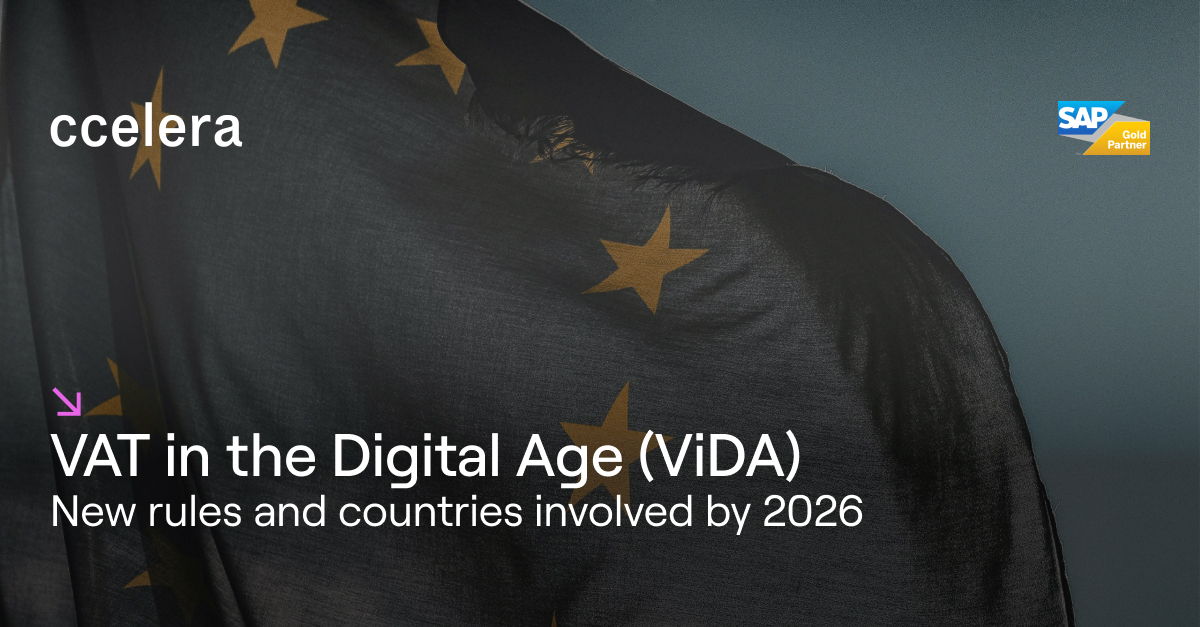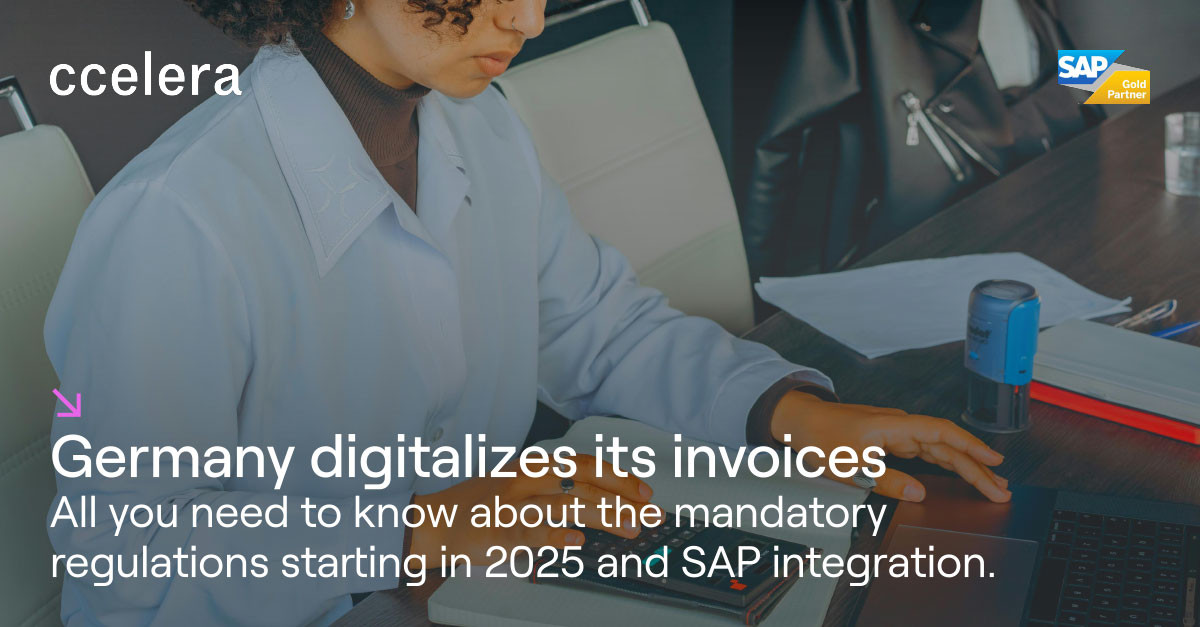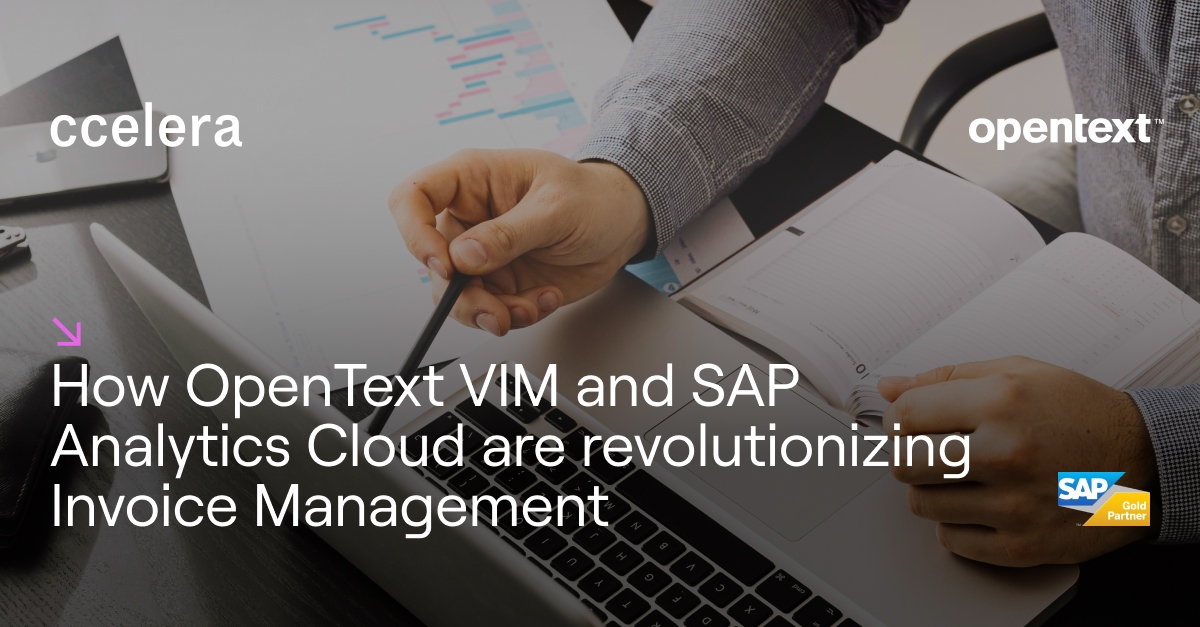
The Introduction of Electronic Invoicing in Germany

Discover the current regulations, the 2025 mandate, and SAP integration.
Electronic invoicing has become a central tool for digitalising businesses and public administrations. In Germany, the digital transformation process in accounting has also gained momentum, driven by the gradual adoption of regulations governing electronic invoicing. A further shift will occur in 2025 when electronic invoicing will become mandatory for transactions between private companies (B2B). Integrating ERP systems like SAP ensures regulatory compliance and operational efficiency for businesses in this context. Let’s explore the structure of electronic invoicing in Germany, the upcoming 2025 mandate, and how SAP supports businesses in this transition.
German regulations on electronic invoicing
Germany adopted electronic invoicing for transactions with public administrations starting in 2020, following European Directive 2014/55/EU. Companies working with public entities must issue electronic invoices using specific formats like XRechnung or ZUGFeRD.
- XRechnung: This is the standard format required for electronic invoices issued to public administrations in Germany. It is an XML file that complies with the requirements of the European directive.
- ZUGFeRD: This hybrid format combines a readable PDF with XML data. It is beneficial in B2B transactions as it allows for flexible handling of manual invoice reading and automated processing.
Since November 27, 2020, all invoices sent to federal public entities must be issued in electronic format, while the private sector can adopt electronic invoicing voluntarily. However, this will change starting in 2025.
The mandatory B2B electronic invoicing requirement in 2025
From January 1, 2025, Germany will make the receipt of electronic invoices mandatory for transactions between private companies (B2B).
This shift is part of a broader tax digitalisation strategy aimed at reducing tax evasion, improving business operational efficiency, and increasing transparency in commercial transactions. Invoices must be transmitted exclusively electronically using standards like XRechnung or ZUGFeRD and sent through secure channels like the PEPPOL network.
The main impacts of the mandate will include:
- Complete digitisation of invoicing processes: Companies must gradually phase out paper invoices.
- More transparent tax monitoring: Tax authorities will be able to monitor transactions in real time, reducing opportunities for tax evasion.
- Reduced costs and processing times: Automating accounting processes will enhance efficiency and reduce manual errors.
As for the issuance of business-to-business electronic invoices, this will become mandatory starting from:
- January 2027 for companies with revenues exceeding €800,000.
- January 2028 for companies with revenues below €800,000.
SAP and electronic invoicing
SAP is one of the world’s most widely used ERP systems and offers specific solutions for managing electronic invoicing, mainly through the SAP Document & Reporting Compliance module. This tool enables businesses to create, send, and receive electronic invoices in compliance with local regulations, including those in Germany.
SAP Document & Reporting Compliance
SAP Document & Reporting Compliance is SAP’s solution for managing the entire lifecycle of electronic invoices, from creation to transmission and receipt. With this module, companies can:
- Generate invoices that comply with local regulatory requirements, such as XRechnung or ZUGFeRD, in XML format.
- Transmit invoices through secure channels, like the PEPPOL network, which European public administrations use.
- Monitor and track the status of invoices that have been sent.
- Automatically update in line with regulatory changes, ensuring continuous compliance.
Integration with XRechnung and ZUGFeRD
To comply with the mandatory electronic invoicing for public administrations and, starting in 2025, for B2B transactions, SAP enables direct integration with the XRechnung and ZUGFeRD formats. These formats are automatically generated from the accounting data within SAP, ensuring that every issued invoice complies with current regulations.
- XRechnung: SAP supports automatically generating the XML format required for invoicing public entities.
- ZUGFeRD: For B2B transactions, SAP allows the generation of PDF files with embedded XML data, simplifying both the invoice’s reading and its automated processing by business partners.
Benefits of SAP integration in electronic invoicing
The integration of SAP in electronic invoicing processes offers numerous benefits, especially in light of the new 2025 regulatory requirements:
- Complete automation: The automatic generation of electronic invoices reduces manual errors and speeds up the issuance and receipt process.
- Guaranteed compliance: SAP continually updates its modules to align with local regulations, ensuring that invoices are always compliant.
- Monitoring and transparency: SAP enables tracking and monitoring of sent and received invoices, providing complete visibility into accounting flows.
- Cost reduction: By eliminating paper invoices, businesses can reduce costs related to printing, shipping, and storing physical invoices.
How to Prepare for 2025
For companies operating in Germany, the mandatory B2B electronic invoicing represents a significant change. Here are some critical steps to prepare:
- Upgrade your SAP system: Ensure your SAP modules are current with the latest electronic invoicing functionalities.
- Staff training: Administrative and accounting staff should be trained to understand the new regulatory requirements and maximise SAP’s features.
- Process testing: Before the mandate comes into effect, it is advisable to conduct internal tests for issuing and receiving electronic invoices.
The Support of SAP and Ccelera
The mandatory B2B electronic invoicing in Germany from 2025 marks a crucial milestone in the digitalisation journey for businesses. Companies must prepare for this change, and integrating with ERP systems like SAP provides an effective solution to ensure regulatory compliance and optimise accounting processes. With SAP and the support of Ccelera, businesses can confidently navigate the future of electronic invoicing, leveraging the automation and transparency these systems offer.
Leave us your email and we’ll get back to you shortly.

